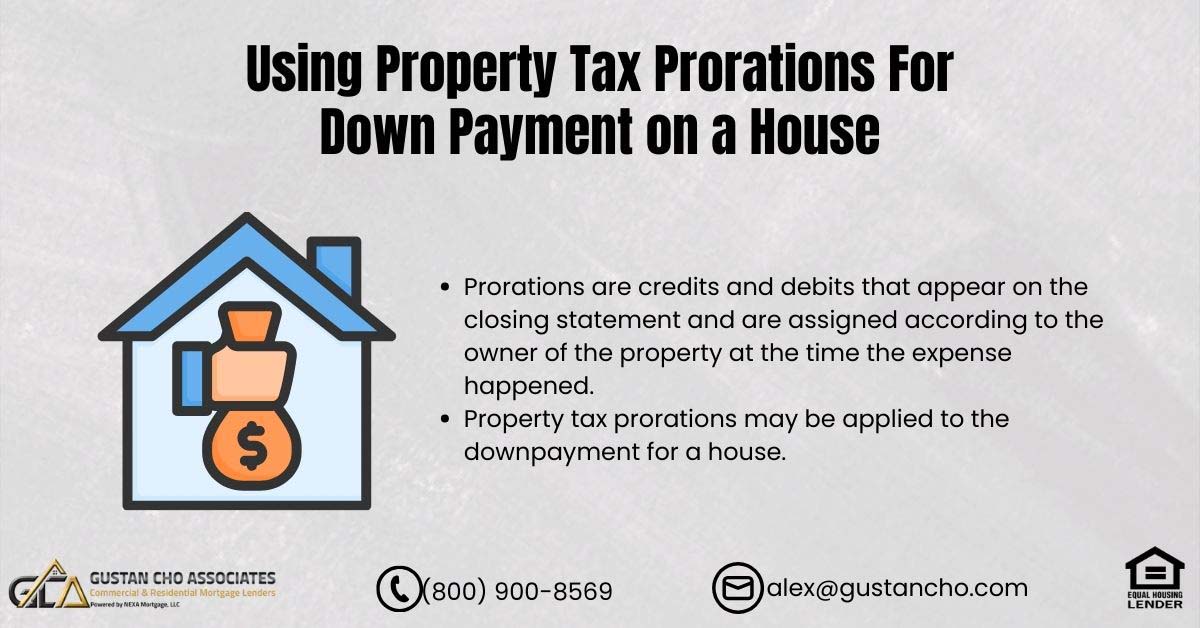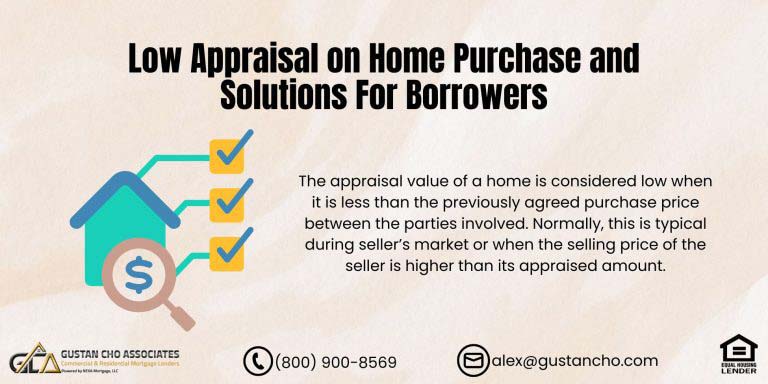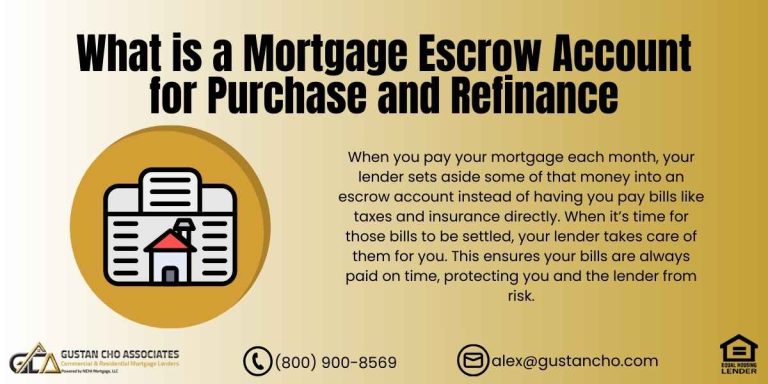This blog post will explore the revised mortgage guidelines on Using Property Tax Prorations For Down Payment on a House. The updated agency mortgage guidelines now permit homebuyers to utilize property tax prorations sellers provide for their home purchase down payment.
Recently revised guidelines from HUD, VA, USDA, Fannie Mae, and Freddie Mac state that property tax prorations are applicable for down payments in states that follow property tax proration regulations. Subsequent paragraphs in this blog will explore the mortgage guidelines for utilizing property tax prorations for down payments.
What Are Property Tax Prorations?
Updated regulations regarding property tax prorations have been introduced to establish new down payment criteria for home purchase transactions in states with property tax prorations.
These regulations specify that particularly in states like Illinois, where property taxes are paid after the fact, property tax prorations can be applied to fulfill the down payment requirement for a home purchase.
Looking to Use Property Tax Prorations for Your Down Payment?
Contact us today to learn how to take advantage of this option and make your home purchase more affordable.
How Does Property Tax Prorations For Down Payment Work?
When you apply for an FHA loan, it’s essential to understand two things: how property tax prorations work as credits and the need to show proof of your down payment. While borrowers can use these prorations as a credit towards their expenses, they still need to demonstrate that they have enough funds set aside for the down payment in their bank account.
For example, a home purchase is priced at $100,000, meaning the borrower needs to show 3.5% of that amount, or $3,500, in their account. Even if they receive $3,000 in credits later on, the lender requires evidence that they have sufficient savings upfront. This is part of the mortgage approval process to ensure the buyer has the financial stability necessary for the loan.
In simpler terms, the lender wants to confirm that the buyer has enough money saved, even if not all of it is used, as this aligns with mortgage approval rules. This way, the borrower demonstrates their ability to manage the initial costs of homeownership.
Can I Use Property Tax Prorations For The Down Payment on Home Purchase?
Home buyers can apply property tax prorations to their down payment when purchasing a home. It is important to note that the down payment, excluding property tax prorations, must undergo verification.
In this scenario, the mortgage underwriter must verify the $3,500 mentioned in the preceding paragraph before issuing a clear-to-close. Any deficiency in funds required for closing must be addressed before the mortgage loan underwriter grants a clear-to-close. When purchasing a home, it’s important to understand the guidelines for using property tax prorations in the down payment process. Mortgage agencies have specific regulations to ensure this process is conducted fairly and accurately.
Property Tax Prorations on Home Purchase In Illinois
In states with a property tax payment system in arrears, such as Illinois, buyers often find themselves able to receive the prior year’s property taxes from sellers during the closing process. Using the above example, if the property taxes for a $100,000 home purchase were $3,000, the buyer would be eligible for $3,000 in property tax prorations. Following mortgage guidelines on property tax prorations, this amount can be utilized towards the down payment on the buyer’s home purchase, providing a beneficial financial arrangement for the homebuyer.
Understanding property tax prorations becomes crucial in navigating real estate transactions, especially in regions where taxes are paid after the fact. It’s a good idea to split property taxes between the buyer and seller during a home sale. This way, both parties can share the tax burden fairly. Plus, buyers may be able to use prior-year tax savings to help pay for their new home. It underscores the importance of familiarity with local tax practices and mortgage guidelines to make informed decisions during real estate transactions.
What Can Property Tax Prorations Be Used For?
The closing balance for the home purchase stands at $3,500, with a reduction of $3,000 attributed to property tax prorations, leaving a remaining amount of $500. To fulfill the down payment requirement and address closing costs, the home buyer must provide $500 at closing. Additionally, if there are surplus property tax proration credits after the down payment application, home buyers can allocate these credits toward covering other closing costs associated with the transaction.
Home buyers need to be aware of the potential utilization of property tax prorations not only for the down payment but also for covering various closing expenses. This provides an opportunity to optimize available credits and ensures a smoother financial transition during the home purchase process.
What Can Seller Concessions Be Used For?
Seller concessions, not the down payment, can only help with closing costs when buying a home. Closing costs are important expenses that come up during the home-buying process. You can pay these costs through seller concessions or a lender’s credit.
In the lender’s credit scenario, the mortgage lender gives you credit to help cover some or most of the closing costs. This option lets you avoid a higher mortgage rate.
Understanding seller concessions and lender credit is important when buying a home. Seller concessions help reduce the financial stress of closing costs, and lender credit provides another way to assist homebuyers with upfront expenses.
Next, we will examine seller concessions and lender credit more closely and explain how they affect the costs of a real estate transaction.
Using Property Tax Prorations For Down Payment and Closing Costs
Property tax prorations facilitate smoother home transactions by allowing sellers to extend buyer concessions. This arrangement empowers buyers to manage a substantial portion, if not all, of their closing costs. FHA guidelines, for instance, permit home sellers to offer up to 6% in seller concessions credits, specifically earmarked for covering closing costs.
It’s worth emphasizing that while these concessions can significantly alleviate the financial burden associated with closing, they do not apply to the down payment on the home purchase. The distinct allocation of seller concessions exclusively to closing costs is a key consideration for both sellers and buyers navigating the intricacies of a real estate transaction.
Two primary financial components come into play for in-home purchases – the down payment and closing costs. While the down payment is a separate financial commitment, the availability of property tax prorations for covering closing costs adds a layer of flexibility for buyers. Understanding the specific utility of seller concessions in this context is crucial for both parties involved, ensuring a transparent and well-managed property transaction.
Want to Use Property Tax Prorations Toward Your Down Payment?
Get in touch with us now to find out how to apply them to your mortgage.
Typical Closing Costs
Closing costs on a home purchase include the following:
- loan origination fees
- credit-reporting fees
- title charges
- homeowners insurance
- attorneys fees
- inspection fees
- other third-party charges that a home buyer may occur in the home-buying process
What Can Seller Concessions Be Used For
Homebuyers can utilize seller concessions for purchasing points to lower mortgage rates. It’s essential to note that property tax prorations cannot exceed seller concession limits. Any excess in property tax prorations must be returned to the home seller, and it is prohibited for home sellers to provide kickbacks related to property tax proration overages.
Case Study: The Johnson Family’s Home Purchase in Illinois
Meet the Johnsons, a young family looking to buy their first home in Illinois, where property taxes are paid in arrears. Thanks to an advantageous property tax system, they discovered they could purchase a $300,000 home using an FHA loan with minimal upfront costs.
Understanding Property Taxes in Arrears:
In Illinois, property taxes are paid for the previous year. This indicates that when the Johnsons purchase their new house, they will receive a credit for a part of the property taxes the seller has already settled. This credit, known as property tax proration, can be used towards their down payment and closing costs.
Key Players:
Home Price: $300,000
FHA Loan Criteria: A minimum down payment of 3.5% is required, generally totaling $10,500.
Property Tax Proration Credit: $15,000 (based on the seller’s taxes for the current year)
The Closing Scenario:
At closing, the Johnsons discovered they had a property tax proration credit of $15,000 due to the seller’s prepayments. Since the required down payment was only $10,500, they could use the entire credit to cover it. This meant they didn’t need to bring any money to the table.
Seller Concessions and Closing Costs:
In addition to the down payment, they needed to cover closing costs, which totaled around $5,000. Fortunately, the seller was willing to offer concessions to cover these costs. Moreover, the lender also provided a credit of $1,000 toward the closing costs.
The Final Result:
Down Payment: $10,500 covered by property tax prorations.
Closing Costs: $5,000 covered by seller concessions and $1,000 lender credit.
Because the property tax proration exceeded the down payment requirement, the Johnsons not only walked away from the closing table without needing to bring any money— they also received a cash refund of $3,500 (the difference between the proration credit and the down payment).
Leveraging property tax proration credits and negotiating seller concessions, the Johnsons successfully purchased their dream home in Illinois with no out-of-pocket costs. This showcases how buyers in states with property taxes paid in arrears can effectively use available credits to make homeownership more accessible and affordable.
How Property Tax Prorations Benefit Buying Homes In Illinois
The benefit of buying homes in Illinois is Illinois home buyers get property tax prorations. Sellers owe buyers one year’s property tax proration credit at closing. This is due to property taxes being paid in arrears.
Home Buyers who need to qualify for a mortgage in Illinois with a national mortgage company licensed in 48 states with a network of over 190 wholesale mortgage lenders with no overlays on government and conventional loans, contact us at Gustan Cho Associates at 800-900-8569. Or text us for a faster response. You can also email us at gcho@gustancho.com.
Gustan Cho Associates has no lender overlays on FHA, VA, USDA, and Conventional loans and hundreds of non-QM and alternative mortgage lending options on primary, second homes, and investment properties.
FAQs: Using Property Tax Prorations For Down Payment on a House
- 1. What Are Property Tax Prorations? Property tax prorations are adjustments made during closing to distribute property taxes fairly between the buyer and seller. In states like Illinois, where property taxes are paid in arrears, sellers often owe buyers a credit for the previous year’s property taxes at closing. Buyers can utilize these credits towards their down payment or closing costs.
- 2. How Does Property Tax Prorations for Down Payment Work? Property tax prorations can be applied towards the down payment on a home purchase, provided the buyer demonstrates the availability of the required down payment amount in their bank or asset account. However, property tax prorations cannot be used as verified funds for the down payment.
- 3. Can I Use Property Tax Prorations for the Down Payment on Home Purchase? Yes, home buyers can utilize property tax prorations for their down payment. However, the mortgage underwriter must verify the down payment amount, excluding property tax prorations, before final approval is granted. Any deficiency in funds must be addressed before closing.
- 4. What Can Property Tax Prorations Be Used For? Property tax prorations can be used for the down payment and covering various closing expenses associated with the transaction. Any surplus property tax proration credits after the down payment application can be allocated toward other closing costs.
- 5. What Can Seller Concessions Be Used For? Seller concessions are specifically earmarked for offsetting closing costs and cannot be used for the down payment. They play a crucial role in facilitating the closing process by alleviating some financial burdens for the buyer.
- 6. Can I Buy a House With No Money Down Using Property Tax Prorations? In states where property taxes are paid in arrears, such as Illinois, buyers may be able to purchase a home with very little or no down payment and no closing costs by leveraging property tax prorations and seller concessions. Buyers can receive cash back at closing if property tax proration credits exceed the required down payment.
- 7. How Do Property Tax Prorations Benefit Buying Homes in Illinois? Property tax prorations benefit home buyers in Illinois by providing them with credits for previous year’s property taxes at closing. This arrangement allows buyers to offset their upfront expenses and can lead to a smoother financial transition during the home purchase process.
This blog about Using Property Tax Prorations For Down Payment on a House was updated on February 27, 2024.
Maximize Your Down Payment with Property Tax Prorations
Contact us now to learn how to use this benefit in your home loan process.











I live in Texas and am looking at purchasing a new construction how. I would be the first resident in the neighborhood so there are no comps. Will they use an estimate of my taxes for qualifying or the actual tax value of the raw land? In the past they’ve used the tax value of the raw land but I’m not sure if that is still the case.
With new construction, it depends on the lender on how they estimate property taxes. Some lenders use 1% while others use 2%. Has otherhomes in the area sold?
Michael Gracz of Gustan Cho Associates is licensed in Texas and is an expert with helping first time home buyers. Michael Gracz of Gustan Cho Associates is also an expert on non-qm loans and bank statement mortgage loans for self employed borrowers.